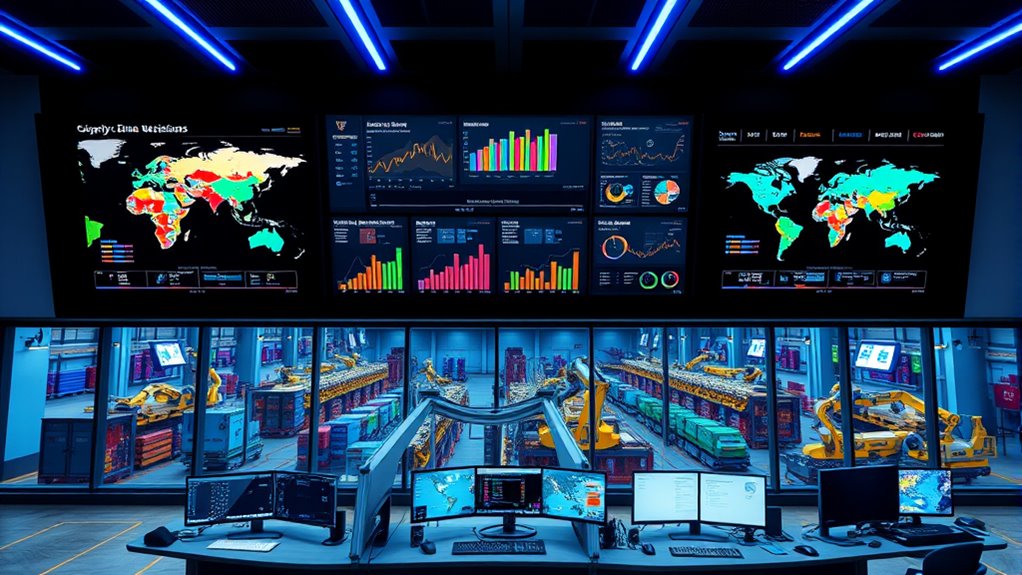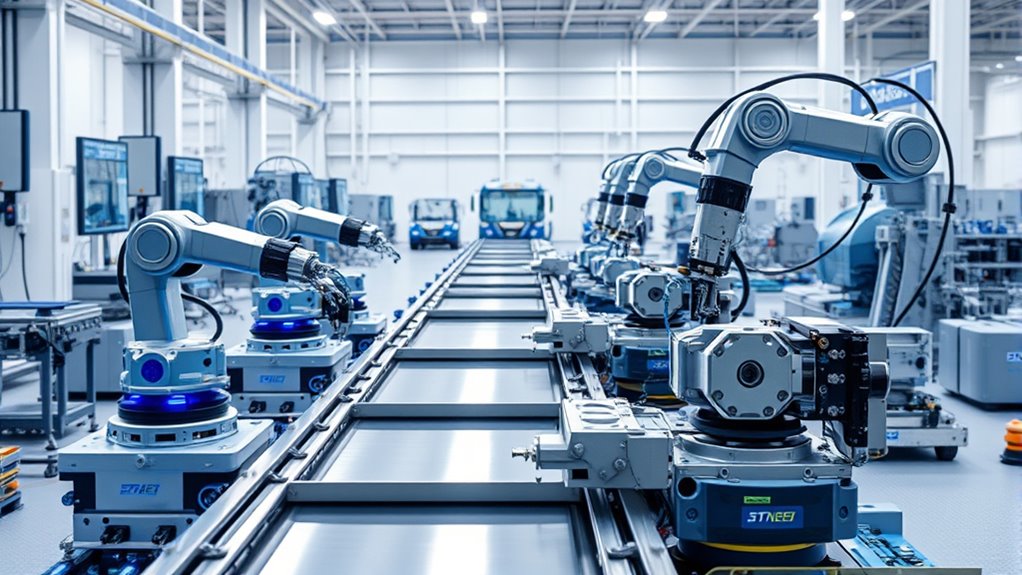Supply chain managers oversee end-to-end operations of product lifecycles in modern businesses. They coordinate procurement, manufacturing, and distribution while analyzing data to optimize processes and reduce costs. Their responsibilities include selecting reliable suppliers, managing inventory levels, implementing quality control measures, and developing risk mitigation strategies. These professionals utilize advanced analytics and supply chain software to track performance metrics and make data-driven decisions. Understanding their complete role reveals the complexity of global supply networks.

Supply chain managers serve as the architects of an organization’s end-to-end supply network, orchestrating the complex flow of materials, goods, and information from suppliers to end customers. They oversee vital sourcing and procurement activities, including identifying reliable suppliers, negotiating contracts, and developing strategic relationships to guarantee consistent material availability at ideal costs. Their role requires constant evaluation of new suppliers and alternative sources to maintain supply chain resilience and mitigate potential disruptions. Companies with strong supplier relationships can achieve up to 5% annual cost savings through effective vendor management and strategic sourcing.
Supply chain managers orchestrate the intricate dance of materials and information, building resilient networks that connect suppliers to customers through strategic partnerships.
In the manufacturing sphere, supply chain managers coordinate production processes to align with demand forecasts and customer requirements. They work closely with factory operations to resolve bottlenecks, implement efficiency improvements, and maintain quality control standards. This involves regular monitoring of production schedules and guaranteeing compliance with manufacturing regulations while seeking opportunities for cost reduction and process enhancement. These professionals often work in manufacturing facilities to maintain direct oversight of operations.
Logistics and distribution represent another essential aspect of their responsibilities. Supply chain managers oversee transportation planning, warehouse operations, and inventory management to secure timely product delivery while minimizing costs. They leverage supply chain software tools to track delivery performance and maintain transparency throughout the distribution network. Through B2B integration, businesses can achieve real-time data sharing and enhanced collaboration with supply chain partners, leading to improved efficiency and reduced errors.
Data analysis and forecasting play an increasingly important role in modern supply chain management. Managers utilize advanced analytics to identify inefficiencies, predict demand patterns, and make data-driven decisions about procurement, production, and distribution strategies. They monitor key performance indicators and collaborate with sales and marketing teams to align supply chain activities with broader business objectives.
Risk management has become particularly significant in today’s volatile business environment. Supply chain managers must anticipate and address potential disruptions from supplier failures, transportation delays, or geopolitical issues. They develop thorough contingency plans and implement risk mitigation strategies to guarantee supply chain resilience.
Additionally, they maintain strict cost control measures across all operations while balancing financial performance with sustainability goals and regulatory requirements. Through cross-functional leadership, they coordinate teams across different departments to secure seamless supply chain operations and maintain competitive advantage in the marketplace.
Frequently Asked Questions
What Qualifications and Certifications Are Required to Become a Supply Chain Manager?
Supply chain managers typically need a bachelor’s degree in business, supply chain management, or engineering.
Most employers require 5+ years of relevant experience in logistics or procurement roles.
Key certifications include:
- Certified Supply Chain Professional (CSCP)
- Certified Purchasing Professional (CPP)
- Certified in Production and Inventory Management (CPIM)
Technical proficiency with SCM software and strong leadership skills are essential qualifications.
What Is the Average Salary Range for Supply Chain Managers?
Supply chain managers in the U.S. earn an average annual salary between $103,129 and $127,197, with ranges varying by experience and location.
Entry-level positions start around $68,969, while senior roles can exceed $150,000. Geographic factors greatly impact earnings, with urban areas offering $100,000-$104,000.
Experience level drives compensation growth: early career professionals (1-4 years) average $81,403, while mid-career managers typically earn $125,000+.
How Has Technology Changed the Role of Supply Chain Managers?
Technology has fundamentally transformed supply chain management through automation and digital integration.
Supply chain managers now rely on ERP systems, AI-driven analytics, and IoT devices to monitor operations in real-time. Their role has shifted from tactical oversight to strategic decision-making using data analytics and predictive modeling.
Digital collaboration tools enable them to coordinate globally dispersed teams, while sustainability tracking software helps measure environmental impact.
Modern managers must balance technical expertise with traditional leadership skills.
What Industries Have the Highest Demand for Supply Chain Managers?
Based on current market demands, four industries show the highest need for supply chain managers:
- Manufacturing leads demand due to complex global production networks and increasing automation needs.
- Retail/E-commerce requires extensive logistics expertise for online order fulfillment and inventory management.
- Technology/Electronics sector needs managers to handle intricate component sourcing and rapid innovation cycles.
- Logistics/Transportation shows 19% projected growth through 2033, driven by global trade expansion and e-commerce growth.
How Long Does It Take to Advance to a Senior Supply Chain Position?
Advancing to a senior supply chain position typically takes 10-18 years of progressive experience.
Professionals usually start in entry-level roles for 2-3 years, advance to mid-level positions within 4-8 years, and reach managerial roles after 6-12 years.
Key accelerators include advanced degrees like MBA, certifications such as CSCP, and diverse experience across multiple supply chain functions.
The path often involves specialization before expanding into broader leadership responsibilities.









